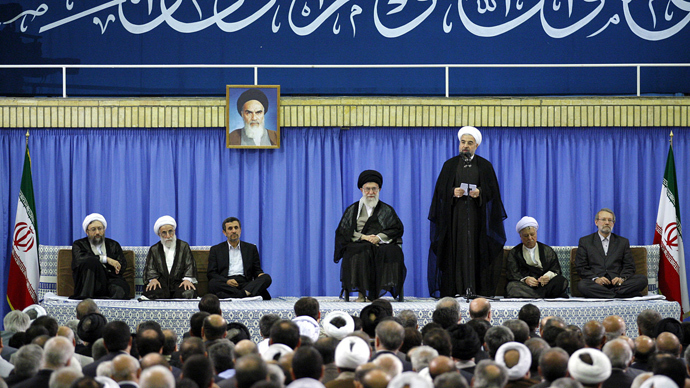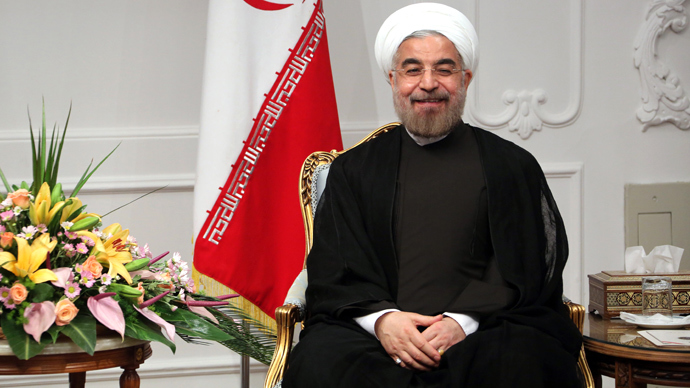Rouhani can’t reach out to US hand that is not there

The new Iranian president is able to unite the Iranians not only in Iran. Washington’s policies are not going to change towards Iran, regardless how much it tries to reach out, Soraya Sepahpour-Ulrich, an independent researcher and writer, told RT.
RT:With the arrival of Iran’s new leader, how much of a change can we expect in the country’s political course and its relations with the rest to the world?
Soraya Sepahpour-Ulrich: I think that Mr. Rouhani will be able to unite the Iranians, which is good news for Iran, of course. Not only the Iranians inside of Iran, but the Iranian diaspora. This will strengthen Iran’s hands in its negotiations. Mr. Rouhani has been welcomed as a moderate and he is a very seasoned diplomat. The people he has on his team in his cabinet are outstanding Iranian nationals. But I think that there should not be the misconception that because he is a moderate he is reaching out and he wants to engage that he is willing to give up Iran’s rights, that he is willing to forego the very principles that are at the core of the Islamic Republic’s policies. One can hope that that attitude toward Iran will change, but they have already vetted the new president with sanctions. Clearly, Washington’s policies are not going to change, regardless of how much President Rouhani tries to reach out. He can’t reach out to a hand that is not there.
RT:How effective are these punitive measures in regards to Iran?
SSU: Unilateral sanctions are never very effective. Even international sanctions have failed to bring Iran to its knees, and if anything, Iran does get stronger and the sanctions do hurt the people. Economically they are damaging and at the same time, if you think about it, about 35 years ago before the Islamic Revolution Iran was dependent on the United States for everything. Not only consumer goods, weaponry, military equipment, but the personnel that came with the military equipment. It’s so ironic, because at the time Iran bought its weapons from America, it did not have America’s permission to build a single bullet for these very guns. Iran is not going to become completely independent overnight after eight years of war and interference, but it’s become incredibly self-sufficient and has made a lot of strides. And that’s in part is due to the sanctions. So that’s the benefits of the sanctions, but they are taking their toll in the people and they are immoral.

RT:The US has said that they want a willing partnership with Iran. Why are they so persistent in pushing these sanctions? Why is the US so demanding that they are tough on Iran?
SSU: They are telling Iran that ‘if you are not going to succumb to what our will dictates, the harsher sanctions will follow suit’. It’s really a warning. They are saying ‘we are willing to engage you, we want to talk to you’ but at the same time they punish them. It’s not just the sanctions, something that is very important to Iran as it should be to any decent citizen of our globe. Towards the end of 2012 the United States delisted a terrorist cult. After Mr. Rouhani was elected, the same cult Mojahed were holding a conference and European parliamentarians and many prominent American former and current leaders were kowtowing on to a woman who was leading the cult and these people who have killed not only prominent Iranians, they have killed even Americans, and they sided with Saddam Hussein when Saddam Hussein attacked Iran. To think that America is genuine in reaching out to Iran it is being naïve. President Rouhani is too well-informed and too seasoned to think that America has Iran’s good will at heart.
RT:The UK was one of the few countries invited to the inauguration. London refused. What do you thing about this?
SSU: You can always try and reach out to people. At times you are willing to put behind you what has come to pass. England is behind many of Iran’s problems, not only in the 1953 coup, but after the revolution. To be honest, I don’t quite understand why Iran would have sent an invitation to London and not to the United States, because they both carry the same policies towards Iran.
RT:Saudi Arabia stopped the Sudanese president's plane from crossing into their airspace. Why would they would have stopped the Sudanese president from going to Iran?
SSU: Historically Saudi Arabia has been Iran’s rival, but more importantly than that, besides that Saudi Arabia serves the United States and Israel, and carries out their orders in the region, should there ever be peace with Iran coming from the West it would really threaten Saudi Arabia. Aside from that Saudi Arabia has a lot of interests in Sudan. It has got millions of acres of farm land that it bought. It’s basically buying the country. Of course it is not going to like the president if the country that it feels some ownership to, to go to Iran, a rival. I think that has something to do with it, too.
RT:Do you think that is going to signal how Riyadh is going to deal with neighbors in the region, working through the United States and Israel?
SSU: It always has. Riyadh feels very secure for as long
as it can be of service to the United States. In the past when a
country in the region has been destroyed, bombed, such as in
Lebanon in 2006, Saudi Arabia has been the one to rush in and
rebuild, and in fact Saudi Arabia benefits from war and conflict
in the region. There is no reason for them to change, unless they
are smart enough to know that down the line it is going to be
their turn. That they are not going to be accepted no matter how
hard they work for Israel and America, they will not be one of
them and eventually their turn will come, too.
The statements, views and opinions expressed in this column are solely those of the author and do not necessarily represent those of RT.












